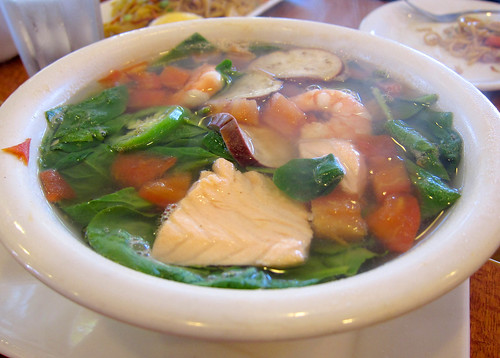Wednesday, September 15, 2010
Kain Na Tayo (or Let's Eat): Sinigang
As mentioned in the blog title, "Kain Na Tayo" translates in Tagalog to mean "Let's Eat" and as you can probably tell, this series is going to focus on Filipino food. Filipino food is still a mystery to many people and I wanted to take this opportunity to share info about specific dishes and also link to recipes. Hopefully, as you learn more about Filipino Food, it's a cuisine that you'll be eager to experience. Click here to check out a Filipino Food Glossary Guide. Today, let's talk a little about Sinigang.
To start, sinigang is a sour dish that is primarily tamarind-based; however, depending on the region of the Philippines you live in as well as what's available, other souring agents can be used. Examples include guava, raw mangos and calamansi (aka calamondin) and any sour fruit that happens to be in season. For the most part, powdered soup base or bouillon cubes for sinigang based on tamarind or calamansi are used in place of natural fruits.
The proteins that are usually used for sinigang are pork, beef, fish or shrimp. At home, my Mom has cooked versions with shrimp, milkfish or pork ribs. The two vegetables that are always present are tomatoes and onions while other veggies can include okra, eggplant, water spinach, daikon, beans or even chili peppers if you want a little heat. In the end, it's really the cook's preference. By the way, to make sinigang vegan/vegetarian, all you really have to do is omit the meat.
All the ingredients are stewed together until the vegetables are tender and the dish is ready to be served. Most restaurants serve sinigang as a soup. At home, I eat it two ways. First, I have a bowl of it so that I can eat it as a soup. Second, I also spoon the broth and its ingredients over a plate of rice and eat it that way as well.
Sinigang is definitely one of my favorite dishes and is really perfect all year round. When there's hot weather, it's a dish that won't leave you with a heavy feeling and when it's cold, it can warm you up from the inside out. Plus, my palate just really enjoys the sourness and tang of the broth and I enjoy the dish even more when sour daikon radishes are part of the dish.
Ready to try out Sinigang for yourself? Click on the thumbnails below for some recipes and take a look at the following links for even more info.
Even More Sinigang Recipes
More Info About Sinigang
If you happen to have a Sinigang recipe you'd like to share, I'd love it if you could post a link to it in the comments section!
Bookmark this post:blogger tutorials
Social Bookmarking Blogger Widget |
Labels:
Filipino Cuisine,
Kain Na Tayo
Subscribe to:
Post Comments (Atom)














3 comments:
Sinigang, wow. I can eat sinigang on a weekly basis. Blog posts like yours inspire me to write, and I really intend to. I always end up spending the day in the garden though.
Hey, a blog should be something fun, not work and if spending the garden feels more soul satisfying at the time, you should go for it. :)
Mmmm, that Sinigang looks really good! I found one place that made the best Sinigang, but they closed. Will have to put that place on my list.
Raeann
Post a Comment